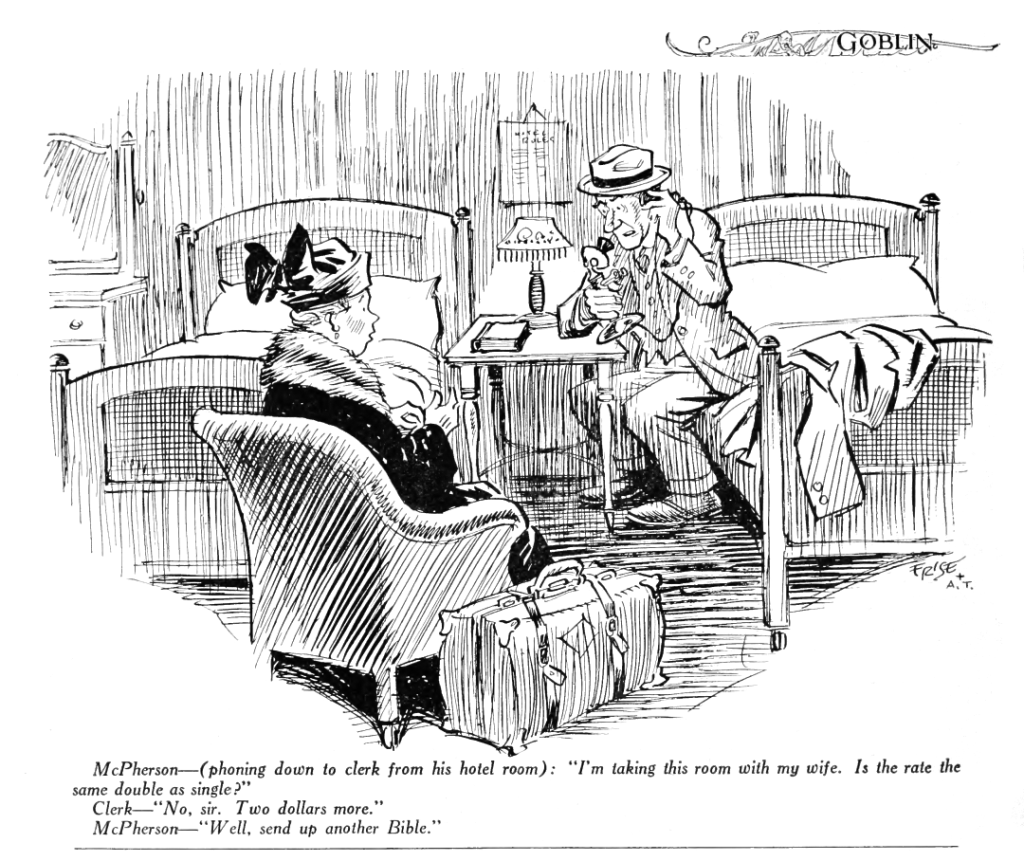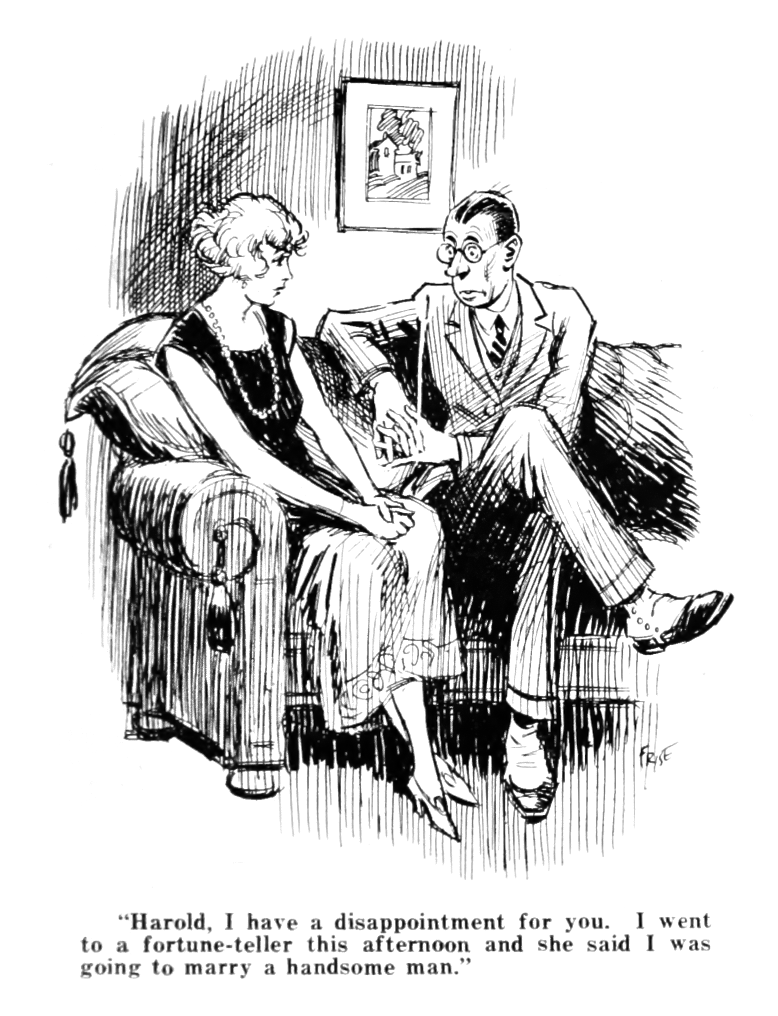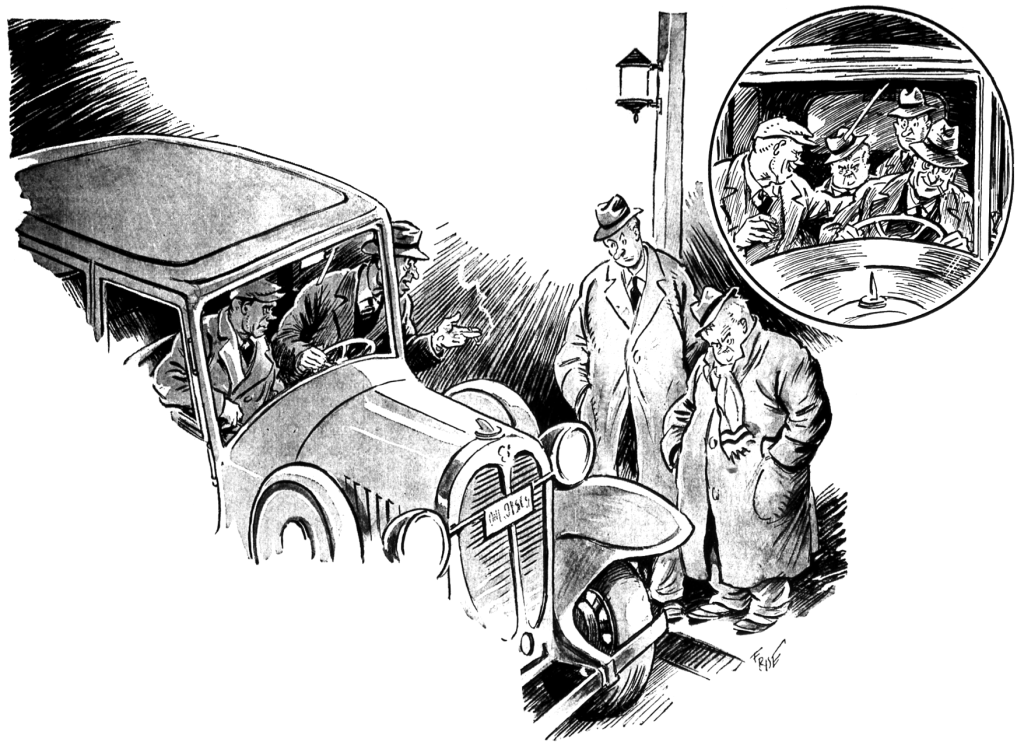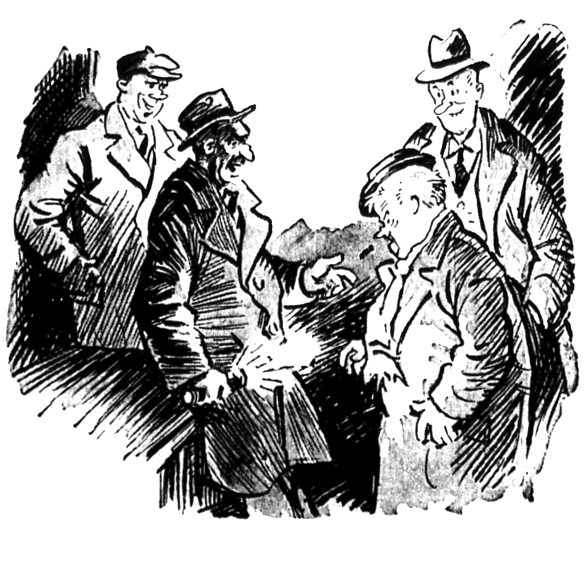
By Gregory Clark, Illustrated by James Frise, February 20, 1943.
“Forty cents!1” protested Jimmie Frise loudly. “Forty cents to develop a film!”
“Ah,” I explained, “but that includes printing the snaps, too. If they’re any good.”
“Forty cents,” muttered Jimmie. “I bet there isn’t two cents’ worth of chemicals used. In fact, the way they put through 500 amateur rolls of film at one time, in a bathtub, I bet the chemicals wouldn’t cost a fraction of one cent per roll.”
“There’s the overhead,” I explained.
“Some little old dirty damp darkroom,” snorted Jimmie. “In some back attic of some old downtown warehouse.”
“Okay,” I submitted. “Then why don’t you develop your own rolls? You say it used to be a hobby of yours when you were a kid.”
“As a matter of fact,” declared Jimmie, “everybody who takes pictures should develop his own. Not only is it a fascinating hobby. It rounds out the whole art of photography. All over this city are nice, happy people with cameras, shooting pictures for all they’re worth. Pictures of soldier sons or soldier sweethearts in their new uniform. Pictures of new babies. Pictures of new brides. A lot of happy, eager people doing their best to capture in pictures a moment, a mood, a crisis of joy or happiness. And then what happens?”
“I know,” I said. “They can’t buy any film.”
“No,” cried Jim. “Suppose they have a film. In 100 different places, at different times of day, by different lights, sunlit, dull or almost dark, these pictures are taken and then rushed to the corner drug store. From the drug store they are collected by the bathtub corporations that develop and print the pictures. The precious, hope-laden films, shot by all these expectant amateurs, are rushed downtown to some damp mass production darkroom, where the whole works are dumped into hog troughs, bathtubs and vats with 19 cents’ worth of chemicals taken from barrels. The whole lot is swished and whirled around for a few minutes and then fished out.”
We Shouldn’t Dogmatize
“What do you expect for 40 cents?” I inquired.
“Well,” declared Jim, “every one of those films in those hog troughs and bathtubs was taken under different conditions of light, under varying conditions of expertness. To get the best out of them, every one of them should, be developed separately, in front of a ruby light, the operator watching with expert care to see that the utmost value of the film is preserved, giving it neither too much nor too little development…”
“Maybe you can get that kind of developing,” I suggested, “by paying for it. But it would be a lot more than 40 cents for a roll all developed and printed.”
“I’ll bet you more swell pictures,” declared Jim, “are ruined by mass development than by amateur shutter snapping.”
“What do you expect?” I demanded. “This is democracy. This is not technocracy. Under our system, anybody is free to buy a camera and shoot pictures. Some buy cheap cameras and never learn how to run them. Others buy costly cameras and make a technical and intricate hobby of it. The ones who buy the cheap cameras and never learn how to operate them are perfectly content to take their films down to the drug store and let the bathtub boys develop them. If they turn out lousy, the least surprised of all is the owner of the cheap camera who doesn’t know how to run it. That’s democracy. It permits anybody own a $500 camera or a $2 camera: whatever you like. It also permits anybody to become his own amateur developer. It also permits a bunch of the boys to organize a little company and gallop around daily, by motor car, to all the drug stores, picking up rolls and pitching them into bathtubs.”
“Democracy,” agreed Jim, “gives elbow room for all the saps. Imagine a guy paying $500 for a camera.”
“And imagine a guy,” I inserted, “paying $2 for a camera and then not knowing how to run it.”
“The more money spent, the bigger the sap,” maintained Jim.
“False,” I decided. “Because maybe the guy who spent the $500 has plenty of money, and if he hadn’t spent it on a camera he might have spent it on a 10-year subscription to all the professional hockey games until the end of the season of 1953. You can never dogmatize about the way a guy spends his money. Maybe the sap who bought the $2 camera and then didn’t learn how to operate it spent $498 on a lawyer to get him out of a breach-of-promise suit. No, sir. You never can say one man is a sap and another isn’t. The safest course is to believe that everybody is a sap. Then you can’t go wrong.”
Sly Digs At Democracy
“Is this a veiled attack on democracy?” inquired Jim sternly.
“Not at all,” I assured him. “The question is: Does democracy breed saps? Or do saps breed democracy? Hitler tried to find out. So he’s finding out.”
“Look here,” exclaimed Jimmie, “you’ve been taking some pretty sly digs at democracy lately. What goes on? Where do you stand?”
“It isn’t democracy,” I explained. “It’s just humanity. Look: we live under a free, democratic system of government in which the elected representatives of the people sit in parliament. Is that agreed?”
“Correct,” said Jim stoutly. “Representative government.”
“Okay,” I submitted. “An election is coming along. So, in the riding in which we live a meeting is held to choose a candidate for the Liberal party. Is that meeting announced? Maybe. If it is, would you and I give up movie to attend it? Maybe. At any rate, in St. Hoosis Hall in our riding on the 27th a meeting is held of the St. Hoosis riding Liberal Association. Forty-seven guys turn up, of whom 16 are professional politicians, each bringing a friend, making 16 more, and the rest of the 47 are guys out for a walk to the corner to buy cigarettes who, seeing St. Hoosis Hall doors open, walked in.”
“Aw now,” protested Jim.
“Meantime,” I went on, “in St. Pollywog’s Hall, in the same riding, the St. Hoosis riding Conservative Association is holding its nomination meeting. It being Toronto, no fewer than 51 people are in attendance. Maybe the same night, in a church basement or in a dancing academy up two flights, the C.C.F. are holding their nomination meeting. It being a slightly northerly section of Toronto, no fewer than 60 people are present.”
“Aw,” said Jimmie.
“Now,” I explained, “besides these riding associations there are the provincial party committees. And besides the provincial and district committees there are the federal party headquarters, with big offices in Ottawa. Now, who do you think is the chairman at each of these three nomination meetings here in St. Hoosis riding in Toronto? Is it just some guy was on his way down to the corner to buy smokes? Or is it somebody they even know about away up in Ottawa, in those national head offices? Which do you think?”
“Aw,” protested Jimmie loudly.
“At any rate,” I pursued, “at each of these three meetings, you might describe as secret societies except there isn’t a tyler2 at the door, highly successful nominations are arrived at. Speakers speak. The calamitous state of the country or vice versa, is dealt with. The candidates are introduced – that is, in case the local boys have fallen out – and then all those entitled, that is, the authentic and accredited members of the St. Hoosis riding Liberal, Conservative or C.C.F. Associations, are called upon to vote. Thus are chosen the people’s representatives in our free, democratic system of government.”
“Aw, that’s cynical,” protested Jimmie.
“Look.” I cried, “you can have your choice: three. The election comes along, and it’s like Christmas. We have three Santa Claus parades instead of one. The three parties parade their people’s choice up and down, and we line the thoroughfares, cheering madly and choosing our one true, genuine Santa Claus. And when it’s all over, the people’s choice is elected. The representative of the people. One of these three guys selected, very, veeeery cautiously, at a little semi-private meeting in a semi-private ward by a little gathering of professionals.”
“We could all attend if we liked,” cried Jimmie.
“So could we all develop our own films,” I submitted. “But it’s easier to just drop them in the drug store on our way past.”
“What you’ve just said upsets me,” muttered Jim. “You make it all sound so cynical.”
“What I’ve just said,” I retorted, “is not mine at all, not a all, not a word of it. It has been said by this country’s very best men, its greatest editors, its greatest preachers, teachers and statesmen for 100 years. If you don’t care for good pictures, okay: let the bathtub boys do your developing and printing. If you don’t care about government – which is how you and your children are to live – okay, leave it to the bathtub boys.”
Jimmie sat silent and grim for a long minute.
“I haven’t got,” he said at last, “a really decent picture of you in my whole album. I’ve got a few snaps of you up fishing at Lac Alexandre and a couple of deer hunting poses. But with that swell old camera of mine I’m entitled to a real, true, characteristic picture of you. We’ve been partners a long time now. I want you to quit at 4 today and we’ll call at my house…”
So we quit at 10 to 4, which is all right for creative workers like us, who are just as liable to run into a million-dollar idea, or a ten-dollar one, which is just as good, riding on a street car as sitting at a dumb desk; and we got to Jim’s before 4.30 p.m., with a fine, ambient winter afternoon light. And Jimmie got his camera and his light meter and sat me on the veranda pillars and made six shots of me at various angles, and I made six shots of him.
“Now,” said Jim, triumphantly, “surprise!”
Unknown to me, he had bought a supply of chemicals, developer and hypo3. And a box of print paper.
And, taking me down to the fruit cellar, he explored amid the barrels and boxes and emerged with a portable ruby light of ancient vintage and several old-fashioned black trays.
“Wonderful,” I crowed. “Why didn’t you tell me you had this equipment long ago. We could have had barrels of fun.”
“After I was first married,” said Jim, “I tinkered with photography. I haven’t even seen this stuff in 25 years. But I knew it was here.”
Jim washed out the trays in the laundry and brought them in full of water of the right temperature. A big tray for washing. lesser trays, one for the developer and one for the hypo or fixing bath. He set them all out in precise like a hostess arranging a table before the guests arrive.
“Orderly procedure,” he explained, “is the whole secret of the job. As a matter of fact, developing and printing pictures is childishly simple. Organize it and you can’t go wrong.”
He then explained to me the process. With the ruby light casting its warm and secret radiance around, we would unroll the spools and then immerse the negative in the developing tray, running it, by a process of up and down, through the chemical for a period of from three to eight minutes, watching all the time, in the glow of the ruby light, to see how fast the developer worked and how the impressions on the emulsion side were coming.
Then, rinsing the film in the water bath, which, under ideal arrangements not possible in a fruit cellar, would be running water, the film would be dipped and run up and down in the fixing bath until all the emulsion was good and hard.
“Then,” said Jim, “15 minutes in the water to wash, and we hang her up to dry. Tonight, after dinner, you come over and we print. Printing is the sport. You can really experiment for artistic results. You can enlarge parts of it. For example, that one I took of you in profile, I’ll enlarge just the head. If I’m any judge, there was a Byronic pose to that one…”
“Come on, come on,” I urged, removing my coat. “Which will I do?”
“I’ll mix the chemicals and you do the slow, even running up and down of the film through the bath.”
“Okay,” I said.
“One last look,” said Jim, checking over each tray, each package of chemical, each spool, all in readiness. “Okay.”
He turned on the ruby light and reached up and switched off the bright bulb.
In the dim ruddy glow, there was an air of mystery, of science, of exploration.
“Wait a minute,” cautioned Jim, “until our eyes get used to the light.”
Main Thing is Ideals
“Stand back a minute,” said Jim, leaning over the trays. And with a spoon he measured out the chemicals, smoothing off the chemicals like a chemist himself. With a stick, he stirred.
“Okay,” he said. “Unroll the first negative.”
I reached and got one of the spools and broke the seal. Carefully I peeled off the outer covering until I came to the film, which I detached according to Jim’s instructions. It was wiry and curly.
“Hold it carefully by the ends,” said Jim, “and now run it slowly and evenly through the bath.”
He stood, superintending. And I dipped the film in the tepid chemical and felt it soften as it slid up, down in the solution.
“How’s it coming?” demanded Jimmie, bending down to get the film between him and the ruby light. “Is it soft?”
“It’s getting wiry again,” I said. “It was soft at first.”
“Whoa,” commanded Jim. “Hold it still in front of the light.”
I held it dripping over the tray while Jim leaned close and peered at it against the red light.
“H’m,” said he.
And before I could utter a word, he reached up and turned on the bright light overhead. In his hand he held one of the packages of chemical, which he was studying intently.
“Just as I feared,” he said bitterly. “You put it in the hypo first!”
“I,” I yelled. “I put it in the hypo!”
So we agreed that, even if we do try to do things right, whether it has to do with representative government or merely developing photographs, it very often means only a lot of fussing, with little result.
“With saps like us,” I explained to Jimmie, after we had properly developed the second roll and found that I had had my finger in front of the lens each time, “the main thing is we at least have high ideals.”
“That’s what really matters,” confessed Jim.
Editor’s Notes:
- 40 cents in 1943 would be $7 in 2025. ↩︎
- A tyler in Freemasonry is an appointed officer stationed outside the closed door of a lodge room to guard against unauthorized intruders. ↩︎
- Hypo is is the traditional term for Sodium Thiosulfate (
), which is used to fix, or stabilize, images as a final step in the photographic processing of film or paper. ↩︎










